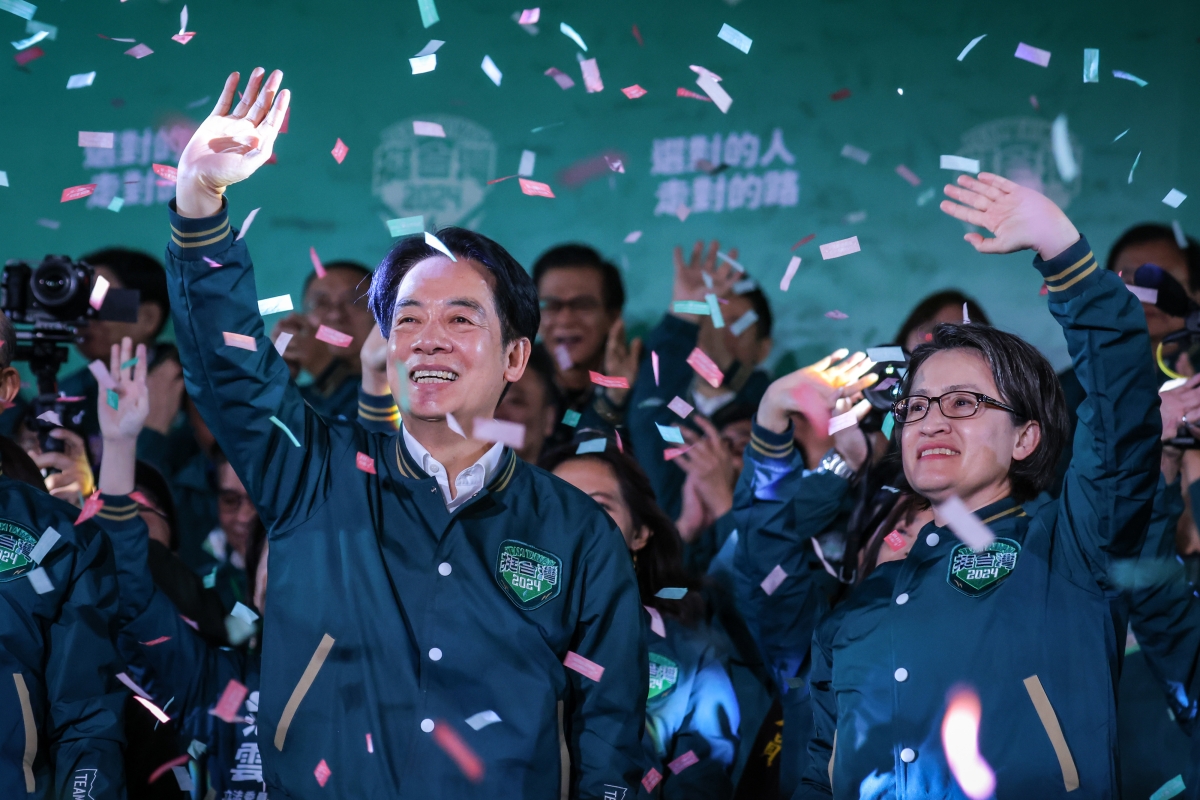Taiwan’s Democracy on Full Display

On Saturday, January 13, 2024, Taiwanese voters went to the polls and elected a new president and 113 members of the Legislative Yuan.
The victory of Dr. Lai Ching-te of the Democratic Progressive Party (DPP) represents a democratic milestone for Taiwan, marking the first time a political party in Taiwan has won a third consecutive presidential election. Voters returned the ruling DPP to power, a seeming endorsement of the party’s policy of pursuing more international autonomy on the world stage.
But Lai’s victory is not without challenges. The DPP lost its majority in the Legislative Yuan, signaling a more challenging and fractured policymaking environment ahead. Furthermore, the win represents a loss for Beijing, which regards Taiwan as a “renegade” province of the People’s Republic of China (PRC) and Lai as an independence-leaning candidate.
How do we make sense of these results, and what might they mean for cross-Strait relations going forward? This election brief aims to unpack these questions.
Parsing the Results
Lai was elected as Taiwan’s president with 40% of the vote, while Hou You-yi of the Kuomintang (KMT) received 33.5% and Ko Wen-je of the upstart Taiwan People’s Party (TPP) garnered 26%. While Lai’s victory was largely expected, perhaps the biggest surprise was the stronger than expected support for Ko and the TPP — a relatively new party on the Taiwanese political scene.
Several key takeaways from the election deserve to be highlighted. First, Lai’s victory in the presidential race was not as overwhelming as in prior elections. Lai’s 40%, amounting to nearly 5.6 million votes, fell far short of current president Tsai Ing-wen’s performance in 2020, when she won with 57% and nearly 8.2 million votes. So, Lai’s mandate to lead Taiwan over the next four years is arguably not as strong or as decisive as Tsai’s.
Second, the DPP’s failure to retain a majority in the Legislative Yuan presents an even bigger challenge. The DPP lost 10 seats, claiming only 51 (38 district seats and 13 party list seats) in the
most recent election compared to 61 in the previous contest. Meanwhile, the KMT received 52 seats (39 district seats and 13 party list seats), and the TPP received 8, all of which are party list seats. A party needs 57 seats to secure a majority in the Legislative Yuan.
This means that the TPP is now the Legislative Yuan’s “swing caucus,” requiring the DPP and the KMT to court the new party in order to pass legislation. Thus, the TPP is poised to act as a power broker, wielding significant influence over Taiwan’s political agenda for the next four years.
Third, Hou’s lackluster result may prompt some soul-searching within the KMT establishment. Hou finished a distant second with 33.5% of the vote, and the KMT failed to recapture the legislative majority it lost in 2016. While it did increase its representation by 14 seats, it did not secure enough seats to pass legislation without help from the TPP. A more challenging reality for the KMT is the distinct lack of support among younger voters — the vast majority of whom voted for the TPP over the KMT.
The long legacy of power and influence of the KMT as the establishment political party in Taiwan is starting to wane. Indeed, political strategists may look back at the 2024 elections as an inflection point in KMT politics, as younger voters flocked to the more charismatic and mercurial Ko Wen-je and the TPP as the party of the future in Taiwan.
China Adopts a Moderate Response (Thus Far)
In the immediate aftermath of the election, China responded with moderation, suggesting a more restrained approach to cross-Strait ties than after previous DPP victories. While Beijing’s least preferred candidate, Lai Ching-te, was elected, China has thus far not undertaken destabilizing military actions near the island or announced coercive economic or diplomatic measures to show its displeasure.
However, the lack of a majority support for Lai provides an opportunity for the PRC to undermine his influence within the Taiwan electorate. For example, in the days following the election, a Chinese mainland spokesperson said that the results “reveal that the Democratic Progressive Party cannot represent the mainstream public opinion on the island.” The spokesperson added that “Taiwan is China's Taiwan” and that the elections “will not change the basic landscape and development trend of cross-Strait relations, will not alter the shared aspiration of compatriots across the Taiwan Strait to forge closer ties, and will not impede the inevitable trend of China's reunification.”
On balance, the rhetoric from China was noticeably muted. While diplomats downplayed the DPP’s mandate to represent the whole of Taiwan, they also signaled an openness to dialogue “with relevant political parties, groups and people in Taiwan.” This response, coupled with a discernible lack of military saber-rattling, suggests a more tempered approach by Beijing in immediate aftermath of the elections.
However, the extent of China’s willingness to continue this moderate approach remains to be seen. Beijing will be watching Lai’s inauguration closely on May 20, 2024 — particularly his articulation of cross-Strait policy — and may react with military pressure.
The United States Signals Support for Taiwan’s Free and Fair Democratic Process
The United States’ response to the elections signaled broad support for Taiwan’s democratic process, while assiduously not tipping its hand over Washington’s preferred candidate. The U.S. State Department’s press release after the election repeated familiar themes from past elections, congratulating the presidential winner and vowing to “work with Dr. Lai and Taiwan’s leaders of all parties to advance our shared interests and values, and to further our long-standing unofficial relationship.”
The United States will maintain its significant position as Taiwan’s main security guarantor and key diplomatic partner over the next four years, especially if China decides to ratchet up coercion against Lai and the DPP. The United States plays a pivotal role in maintaining the “dual deterrence-reassurance balance.” This delicate balance — which requires deterring the PRC from unilateral military action to change the status quo and deterring Taiwanese leaders from formally declaring independence, while at the same time reassuring Beijing of America’s “one China policy” and reassuring Taipei of continued strong U.S. support of Taiwan — is likely to become more challenging in the future.

